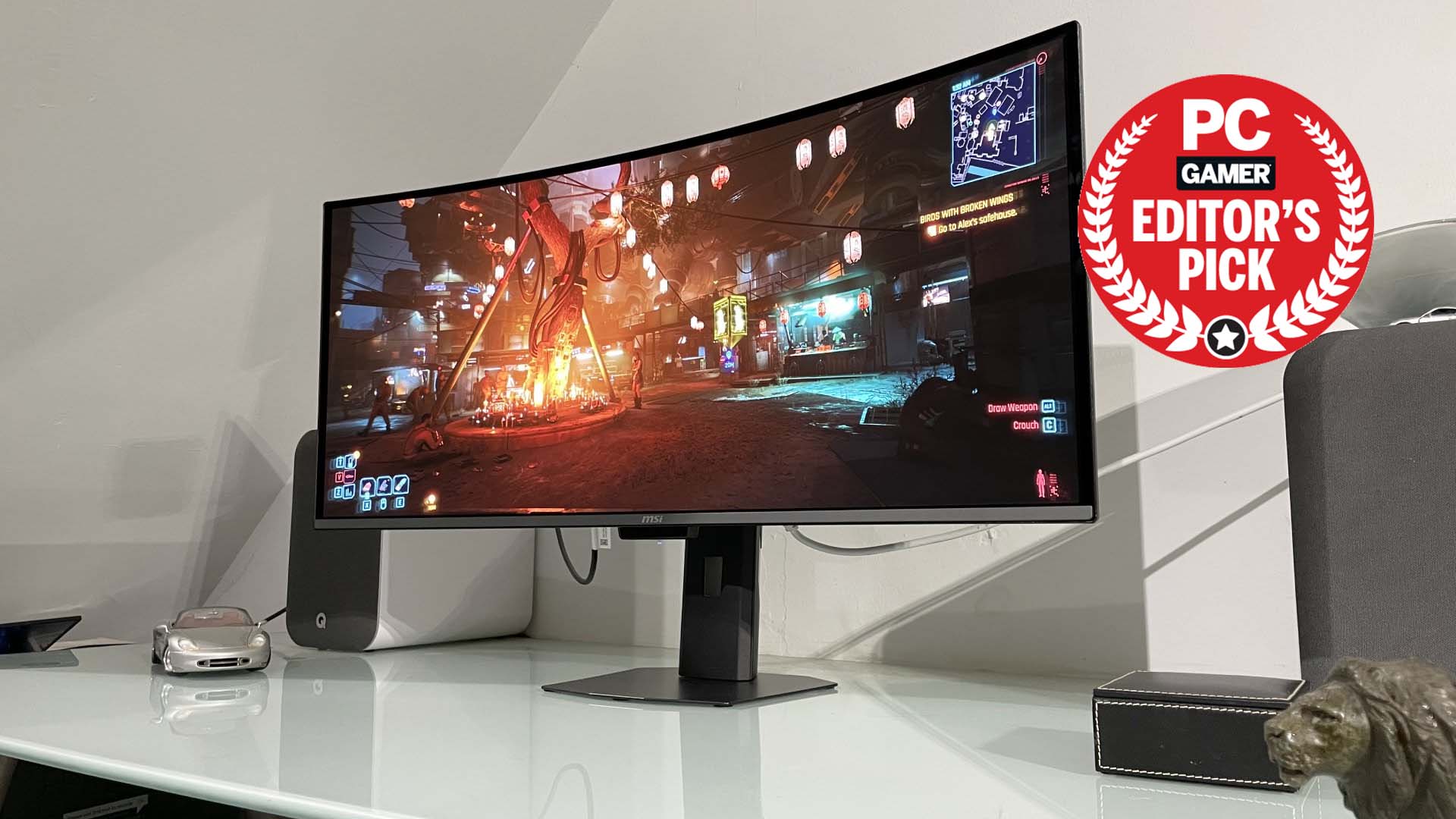Arma 3 interview — map design, radios, porting Day Z into Arma 3
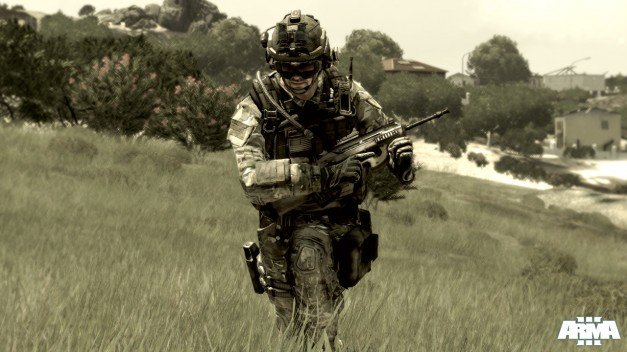
I interviewed the creators of Arma 3 and Day Z at E3. This is a continuation of that conversation (read part one of the interview over here), with discussion ranging from engine optimization and what hardware you'll need to run Arma 3 to the possibility of baby monitors appearing in Day Z as usable radios.
PCG: Whenever we post an Arma 3 article, we get comments like, "I can hear my graphics card crying." I noticed that you guys recently announced some revised system specs.
Jay Crowe: Yeah.
Do you feel like it was a mistake to come out a year ago and say that a Core i5 CPU was the target spec?
Crowe: I think maybe the mistake would have been just releasing target specs at the time. But on the other hand, they generated a lot of people saying, “Oh my God, I need an i5, it's going to push the hardware...” So it got people's expectations going. Maybe if we'd also put it alongside some min specs as well... It would have been useful.
Does the reputation of Arma being a demanding game bother you?
Ivan Buchta: Well, it's like... The gamer with a cheap hard drive and an excellent graphics card, things like that, he may suffer from the weakest part of the hardware, which is just getting the data into the GPU...
Keep up to date with the most important stories and the best deals, as picked by the PC Gamer team.
Dean Hall: : We don't run supercomputers. None of our computers seem particularly amazing in Brno, anyway.
Crowe: We sit on gold thrones...
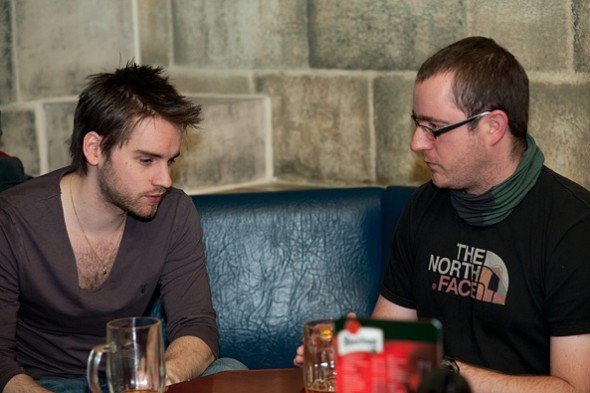
What were you guys running Arma 3 on at E3?
Crowe: 580s and i7s. Not even SLI. Just one graphics card.
One 580?
Crowe: Yeah. My system that we captured the videos on, that's a special one... I think 560 on an i7, 3.2GHz or whatever? The SSD helps. It's all little bits of good components, overall, that make the game smoother. They are running really nice at E3. In fact I'm going to print out that DirectX config, post it up and say, “Guys, this will run smooth, we're happy with it.”
Hall: : I mean, my personal computer isn't anything kick-ass. If you can run Arma 2 you can run Arma 3. Everyone's saying they'll need to upgrade their computer—you'll need a reasonable graphics card, but the average user doesn't need a latest-generation graphics card.
Dslyecxi: One part of it, also, it's so easy for people to set their settings wrong. You can have one setting be wrong and it ruins the whole thing.
If you can run Arma 2 you can run Arma 3.
Crowe: I could easily have broken the E3 demo just by putting view distance from three to six [kilometers]. It's definitely giving a lot of power to the players to break their own game, and that's true of modding as well. There's a lot of things that can completely break the game. We really started to take on a bit more with Take On Helicopters. These guys really want to have great, great cockpit resolutions, so you're going to have to increase their 3D resolution, but they're going to have to sacrifice something else, because then the graphics card is working 150 percent. Turn down the view distance, maybe? The simplest thing I might do for graphics settings in Arma 3 is rename "very high" to "stupid." And then just bump everything down. So then somebody says, “Why would I put it on stupid? Just put it on high.”
Buchta: Maybe we can rename the options to "reasonably good," "pretty okay," "really nice," and "insane."
Hall: : But part of the problem is, people think, “Oh, I've got a moderate system, I'm going to set everything to low,” but you can actually get bad performance from doing that. Because it puts everything onto the CPU.
Crowe: Yeah, like shadows for example. If it's on normal, it's run by the CPU, if it's set to high it's on the graphics card. Even things like chunks of data, if you have very high quality, it's a bigger chunk and it's easier to load.
Buchta: Yeah. Video memory, it's the most tricky thing, because you're actually setting whether it should be somewhere completely else, you're setting how much video memory is dedicated to the game. So in fact, to achieve good performance, you should have everything on normal, but set this to very high, so you can make sure that your video RAM is used properly. I wonder why we keep this setting, by the way, maybe for some crazy diagnostic purposes...
Crowe: And there are more video options now, we've got clouds, we've got dynamic lights that we can talk about, picture-in-picture, all these things we could ratchet up and down. Half of the challenge is going to be saying, “These are your options, this is how to use them,” and presenting it in a usable way.
What types of combat experiences am I going to have in Arma 3's maps—Limnos and Stratis —that I haven't had in Chernarus or Takistan?
Dslyecxi: What's the name of that bamboo stuff, the giant bamboo?
Buchta: They're reeds, actually.
Dslyecxi: That'll be a big influence...
Buchta: We still need to work on that...
Crowe: There's some hit bugs we need to work out...
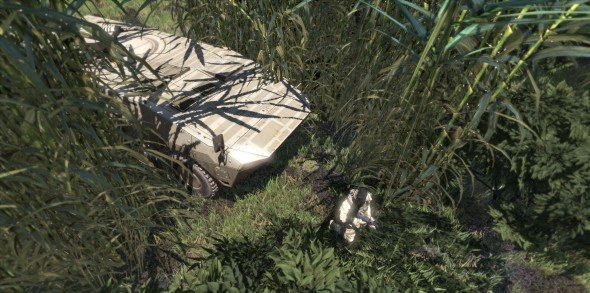
Buchta: That's about the densest vegetation you can find on the island. Well, Limnos, the island is pretty variegated, actually. It's the first really flat terrain we have. We have sufficient amounts of terrain resolution to have some bumps in the otherwise flat terrain, so... I wonder how, for example, tank fights will proceed in these areas, because even those reeds, they're a visual barrier. We had a big multiplayer...
Crowe: The multiplayer game, that was... It wasn't so stable, but I was in a convoy, Joris [-Jan van 't Land, Senior Designer] is in front of me, somebody else is in front of that, another tank column coming up the side, real World War II stuff like that. It was a lot of fun. A lot more room to stretch your legs.
Buchta: One particularly important thing from my perspective is that the... Even the smallest village is fairly big compared to the previous versions of Arma.
Even the smallest village is fairly big compared to the previous versions of Arma.
Hall: : Huge! The scale is just insane.
Buchta: And the landscape structure, with the irrigation around the villages, it's a fairly big maze surrounded by shrubs and trees and orchards, and then there's flat land, fairly open terrain. So if we'd be introducing anything like a terrain control into multiplayer, there will have to be some really well-coordinated strikes against the defensive establishments of the enemy.
Hall: : Very complex.
Buchta: You are quite exposed when you're attacking these places, and these places can be defended quite easily, because you're shielded by the vegetation, and you can simply hide in the arbor and run and pretty much line up the attackers into a few kill zones. There are areas which are just impossible for vehicles, and for infantry as well. There are some natural fortresses. Or quite important barriers in the terrain. You have to go for that. The range for engagements will dramatically increase on open land and dramatically decrease in the urban areas and the farmlands.
Hall: : When we were doing the VIP missions in that, we'd get really tactical and we'd be running around fighting and taking cover and... It was just so much fun. And I don't think... If there was something that wasn't quite nailed... A little bit with Takistan? Because it was quite open and there wasn't necessarily a lot of cover. But with Stratis, I've really often felt like you're doing bounding cover and... You could do really well score-wise if you were fighting and using the terrain well, carefully moving through the city...
Crowe: I was dominating that VIP, I was picking off all your guys...
Hall: : But the guys, some of the artists were... I was like, “What are you guys doing?” I was starting to get angry at them because they're just running across in the middle of everywhere. Ivan, you've been really particular with the artists. I love that attention to detail that you're putting into the map.
Buchta: At some point I got really pissed off with the level designers' work on the open terrain... They simply needed to understand stuff that we're trying to do, trying to do some compositions of stuff. Then I simply placed myself with a machine gun, removed their weapons, and said, “Okay, move from this place to here.” And I just starting hosing them down.
So you shot at your artists to help them understand how the map design needed to change.
Hall: : But it was good, that kind of brutal approach.
Buchta: We applied a similar pipeline for Limnos as we did for Chernarus, but we got more guys who are more experienced and more diligent. It's actually finally smoother. We have compartmentalized the area, there's always a responsible map designer who places all the objects to this terrain and such. There are some nice places... I try to read and learn about Lemnos as much as possible. And I also try to make sure that there's good terrain for mission designers to place their work on.
Crowe: It's really difficult from a design point of view to start making missions while the map is still in progress.
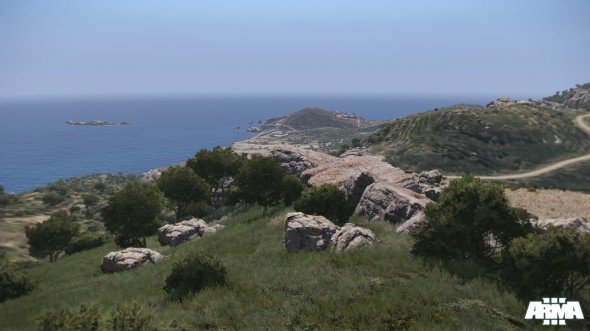
Buchta: Yeah. That's why we've prioritized the areas which are likely to be used first. I do these inspections, where at some point, the guys all join me in multiplayer, and we're driving around in cars, walking... It was like buying a property or something like that. Walking around... “Okay, you see this, and it's nothing you would notice in the editor, but from this perspective, this is just wrong. Here we have a lack of cover. Here you get in tank range and then you place these objects, it's just impossible.” The guys have really changed their methods. Time after time, I do a little lecture to all the map designers, to return things back... But it's very exciting. Now we are getting to the stage where we can start really adding the fun stuff, like traffic signs, special objects. I think that the areas have some really nice terrain, some of them. Also, the graphical balancing of things, getting proper vegetation, balancing the coloration of satellite textures and stuff like that.
Hall: : The night battles are going to be crazy. I don't think people really realize. I did a lot of testing, and the crazy battles you get, wow. I had my AI guys setting up machinegun emplacements and the tracers coming down and then vehicles exploding. And then you see all the flame effects from it. It's always a little bit disappointing sometimes with Arma 2, you put the NVGs on and it...
The mystery goes away.
Hall: : Yeah, the mystery goes away. But man, I was just having crazy stuff happen. And a squad on open terrain... We did that, it was a little broken, when we did that one multiplayer piece...
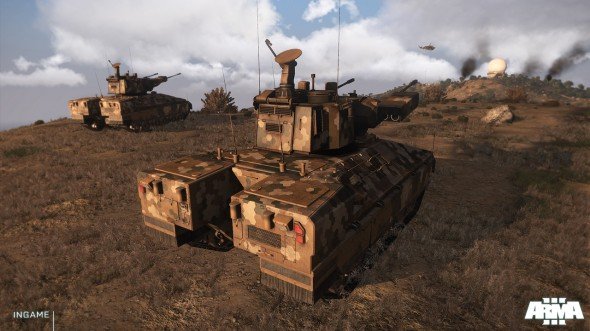
Dslyecxi: I did that, at nighttime...
Hall: : Remember that? It was insane! We had burning wrecks everywhere, we were hunkered down by the...
Crowe: I joined in progress and kept getting shot in the head by people like him.
The night battles are going to be crazy.
Buchta: We won just by making a small group and taking the objective long enough to score some points.
Hall: : That was good.
My friend wrote a mod about a year ago that made every bullet into a tracer. Night firefights resembled like Star Wars.
Hall: : Part of our [military] training in Thailand was a live fire exercise. I'm not even talking .50 cal, I'm just talking about 7.62, like any machine gun, going off. You feel those rounds.
Dslyecxi: That light .50 is amazing.
Hall: : Yeah. We had our jeep MG firing at a target, and when it was firing, we would go around. So you would feel the rounds go beside you, you'd feel the shock. Your balls go [Hall makes a sound that conveys the experience of groin reflex with surprising accuracy]! And it was in Thailand, it was so hot that the target actually caught fire, you know? Because of the rounds and the friction heating up the air, not even the bullet impact itself. But what I did the tracers in that way in-game. The AI guys were actually setting up, using the terrain, setting up fire positions that made sense, and then concentrating fire. It was just awesome. You'd see this tracer and hear the thud-thud-thud ...
Dslyecxi: One thing that I'd like to see that I haven't seen yet in, I think, any game, is tracers hitting something and being stopped by it and falling down but still burning for a few seconds.
Hall: : Yeah. We can actually do that because that's what I do with the flares and the chem lights in Day Z. Their “time to live” is just ridiculously high and I just change their simulation check time so it doesn't have to check them.
Crowe: I was looking at the [E3] showcase today, and I don't know how I didn't spot it before, maybe because most of the time I had NVGs on, but I was just without it on, and I saw some muzzle flashes coming from behind a bush. And that was, again, muzzle flashes look nice for the player... And then it became a tactical thing.
Hall: : Absolutely.
Crowe: These guys didn't have the suppressors on their weapons, so I was able to see it. I was like, “Ah, that's smart...”
Buchta: Some of the muzzle flash suppressors are going to become a really important part of Arma.
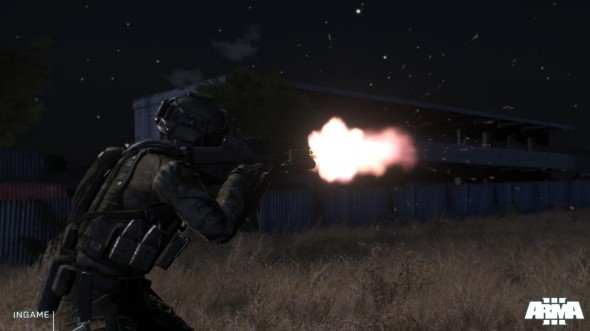
Hall: : It's a big deal in real life. That's why your ambush has to be timed perfectly. Yeah, the muzzle flashes in Arma 3 are like, massive big win. There are so many variations of them, you fire them, they each look different...
Buchta: But it's actually a quite clever little thing. The muzzle brakes are usually symmetrical, so we suggested that it could use the proxy model, but rotate it in a random fashion. Every time you shoot, it's displayed rotated randomly in steps. It looks sufficiently different every time.
Hall: : Wait a minute, is that what it is? Holy cow, I thought they were actually different models. You destroyed the magic, the magic is gone!
Buchta: Sorry. I thought you knew...
The man behind the curtain. The muzzle flash behind the curtain.
Crowe: There's also something I haven't shown in videos or screenshots yet, because they're not quite done. Rockets have got new blast-back, so they're not just this sort of square bright thing. They light up the ground with this similar sort of real flash of light. I want to get some really nice nighttime rocket fire going on.
Have you played the Crooks mod for Arma 2? We play it all the time on our server, it's cops and robbers. There are like three robbers and 30 cops that uh, work together to protect AI prostitutes.
Hall: : I think I might have seen YouTube videos of this...
Kind of like Day Z, it has that same “needle in a haystack” feeling when you see someone. It has a similar emphasis on vision. The police eventually get access to helicopters, get in the air, and start scanning the ground for movement. It's sort of like The Fugitive. If you find them, it's your responsibility to just keep visual contact.
Hall: : Yeah, I like the sound of that. It sounds like City Life, but without all the dinking around...
Dslyecxi: There was something we used to play back in Flashpoint called Murder Sim, which was the same basic idea. You had four bad guys who went around trying to kill all the women in these specific cities before the cops could get on to them and stop them.
Hall: : That is cool. I like that.
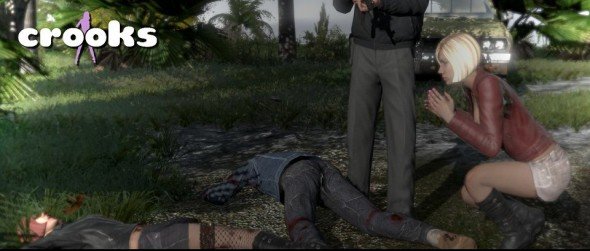
It's a nice progression. It's only the eastern side of Chernarus, from like Gorka down to Solnichniy and, like, Msta and Tulga, that's the southern limit I think.
Crowe: Ivan probably doesn't respect your pronunciation of the towns...
Yeah, sorry. This is what happens when you parrot the names to each other over two years without actually knowing how to say them. But yeah, Crooks is really special.
DH: I think with simplicity, when you get it right, you know, because you've nailed it. Sometimes I think with modding, people are trying to just add more s#$*, and you can't just add more s$*&. And that's what I like about the idea that you just described, you could describe it in 20 seconds and it makes sense. What makes a game great is what you don't put in it.
What's your process like, then, for adding new features to Day Z? How are you holding up, though? You're getting bombarded with feedback and bug reports on a daily basis, partly because Day Z happened to get popular so early in its life, like Minecraft.
Hall: : It's very easy to start losing your way. I literally had started to lose it from lack of sleep and totally focusing on it all the time. Especially when I was used to developing in secret. And because I told myself, “I'm not allowed to announce this until it's finished. That's your motivator. Because unless I finish this, nobody will ever hear anything about it.” And you remove ego from it because you're just getting raw feedback from people, friends and stuff who've known me for like ten years. Then when you suddenly open it out, it's really easy to lose your way initially. That's where you need the people to pull you in.
If it doesn't stay as a community-driven project where I'm directly plugged in with the community, having real level playing field discussions, almost arguments, with the players, then it's going to fail. Because I'll never be able to maintain the tenacity, the ability to hold to those key ideals unless I'm in there with them, reading about how 4chan hates me and crying, and then hearing Reddit abuse me. You have to be grounded with that, otherwise it'll just go off on some... We'll be paying for hats and stuff.
Some people would call that masochistic, but it seems like it's working out. How do you prioritize new features and changes?
Hall: : I guess it's a matter of sanity that I need to work on something new. And it's also the players who need to see something new. And because it's out, it's the start of an alpha mod, it needs to be a period of adding some features. So... I guess the main thing is to pick the hard stuff, because I think you get the hard stuff out of the way now. That was why I picked the temperature one, because it's so important. I think the game can survive without the crazy meta-game group stuff, because that'll happen anyway even if there's not mechanics for it. But the temperature, that connection with the environment stuff, that needs to be solved.
Buchta: I'm going to spend the next four weeks in Chernarus. Partly in the virtual one, partly in the real one. We just decided to address some obvious issues which are related to the environment, to provide Dean with a better maps.
"What makes a game great is what you don't put in it."
Hall: : It's going to be amazing. Actually, do you remember our first conversation we ever had on Skype? It was about Chernarus. I wanted some advice about Chernarus, we got talking about it, you sent me pictures of around it and that... It was years ago. I think it's almost a very underrated map, because a lot of people couldn't really run it. I couldn't run it on my computer when Arma 2 came out.
Buchta: It was partly our fault, because optimization of course was something I'd definitely like to do... We planned a four-week sprint towards some better mapping... I've mentioned to our lead programmer, just some classified information, we'd like to expand the Chernarus theme in the Arma 3 engine, partly because of Dean's zombies, partly because it's a good map and we know it. We can get the data real cheap and we already have a working basis, so there will be more realistic terrain and new vegetation. And I'm also trying to push all those environment-related things like underground structures, bridges, better handling of water, power lines, many things which were omitted.
Is there any fundamental technical hurdle that would prevent you from porting Day Z directly into Arma 3?
Hall: : I guess the thing about Day Z, it's actually a lot easier than what Arma 2 does. And a lot of it's in finite state machines now. I'm slowly moving it. And those can just be compiled. They can even be compiled to the engine and run engine side, which is a lot more efficient. But it's pretty basic stuff. And the way it's designed is very modular. So the only thing we'd need to do is go through and configure the buildings, the spawn positions. Basically you can configure that in about an hour. It took me about an hour to do Chernarus, just going through the buildings, placing gear here and here and here. I have a little mission, I run around each building and pop the stuff and then it's done.
Do you feel like Santa Claus when you're doing that?
Everyone: [laughter]
Hall: : Yeah, a little bit. But I think it's a really exciting time for BI. If we can get Day Z working and we can get some good success and some really strong sales out of it, then it can get a bit more ambitious. And then that technology can be pulled across. Because if you remove the zombies out of it, it's a pretty basic sort of technology, and a lot of that will be applicable to do the sort of large-scale stuff that we always thought of for Arma 3. And then other ideas that can come out of that... The cool thing is that they're different and they're not hurting each other. They're mutually supporting.
Dslyecxi: If you could just take the persistency aspect of it and do it on a very low scale, single-mission basis, such that someone who crashes or disconnects or whatever can reconnect to the game and pop right back in...
Hall: : It's done, I've had that for a year with the USEC system. And that's why I want to give you that revolution system. I showed it to the guys when I started working there. It's fairly basic, but...
Buchta: Basic is just enough, I think. Once you start altering it, then you aren't helping in anyway.
Hall: : But there is a full logistics suite. I'll send you the source [code], it's reasonably easy to get running.
So, you mentioned the player that decided to roleplay as a doctor in Day Z—the most dangerous and interesting “career” I can think of would be getting who gets a car, having a group of people to protect it, and starts charging for travel. Like a taxi driver.
Hall: : It's actually been done. Someone was running, with a helicopter of all things, they were running a public transport network for a while.
Were they charging for it?
Hall: : No, they were just doing it with donations. I think they were going for desperate people, sort of like a flying doctors type of situation.
A guardian angel.
Hall: : The people below were so grateful that they weren't shooting.
Buchta: That's why I would like to see the radio simulation in Day Z. It actually makes sense. Having radios with various ranges, channel access capability, then you could really be saving your battery for a hairy situation and trying to call for help... “Is anyone here, does anyone hear me, I'm somewhere near Vyshnoye...”
Hall: : And that's why, I think, if we do this amalgam of central server-oriented and peer to peer, we can do all this crazy stuff, because you can do as much stuff as you want locally. If we split things, and really ask ourselves “Do things need to be on the server or do they need to be on the client?” then we can get bigger and bigger servers that are actually doing less and less. At the moment, all a Day Z server does is all the stuff a normal Arma 2 server does, and soaking stuff up to the database. That's it. It doesn't even analyze the data. There's an application that sits between that and the database that checks to see if what it's getting makes sense, to look for hackers. But yeah, I'm just thankful that Ond?ej [Špan?l, Lead Programmer] is interested. That's going to mean that we can enable all this peer to peer stuff that is sitting there not being used and doing some really cool stuff.
Buchta: It's not a problem of design, it's a problem of execution at the moment, because it's not terribly difficult, but it's a large problem, it's rooted in many aspects of the game, starting with players, multiplayer, ending in the AI permutations. It might well be possible. And Marek [Spanel, CEO] has been musing about this for some time as well. I think a little variety, like just commercial walkie-talkies, even like the kind a babysitter uses...
Hall: : Oh, yeah, a baby monitor, I want to see that. Cruising around Cherno with baby monitors.
Different tiers of radios?
Hall: : I can see the merchandising options of that already.
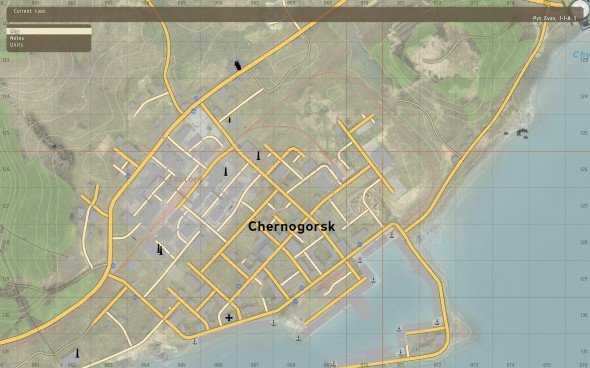
Buchta: You could even help people with it in-game...
Hall: : Oh, wow. There's some serious emergent gameplay opportunities there.
"I want to see that. Cruising around Cherno with baby monitors."
Dslyecxi: Have you played with ACRE [Advanced Combat Radio Environment, an Arma 2 mod] much?
No, I've watched video with it, but I haven't, no...
Dslyecxi: Yeah, it's pretty cool. Terrain can influence it, if you're in a forest it'll cause it to show shorter ranges... If you're moving away, their radio is having more trouble reaching you, they'll actually hear you distort and break up and eventually you'll lose them entirely. So if someone really broke up, they could be saying things very slowly and deliberately for you to understand it...
Hall: : Well, we had guys from ShackTac making zombie noises to freak people out...
Dslyecxi: They have it set up where you can do re-transmission stations, have one radio that'll bounce off relays to get around.
That seems like a natural fit for Day Z; if there's a radio transmission station at the top of Green Mountain, that becomes a really valuable point, a clan wants to own that spot, they can talk to another point...
Hall: : And imagine if we start making maps bigger and connecting more worlds together to an extent, and then radios become important. You get a whole meta-game going on.
Buchta: Yeah. Even protecting this infrastructure. Suddenly you lose a connection, well, what happened to the guys? That's one of the other potential aspects which can be explored, like making safe zones. I can imagine that at some point, we may end up having no zombies, because they'll be extinct...
Hall: : At least on certain servers...
Buchta: But people will be renewing civilization. They're already trying to mimic services. Imagine with the radios, there could be radio stations...
What do you think inspires PC gamers to make their own fun in that way?
Hall: : I think persistence switches something in people's heads. Because they know that the character's going to be there later. You play differently. You see it in the way people play. They can't even help it. They just approach it differently. You watch some of the live streams where they're like, they want to go in and grief people, but they end up not doing it, because they can't help themselves. It's quite amazing.
Read part one of the interview here, or sift through the rest of our plentiful coverage of Day Z and Arma 3. Watch my Day Z video diary, flip through my most recent photo diary, read my E3 Arma 3 preview, or pull up our installation guideif you're thinking about downloading Day Z.

Evan's a hardcore FPS enthusiast who joined PC Gamer way back in 2008. After an era spent publishing reviews, news, and cover features, he now oversees editorial operations for PC Gamer worldwide, including setting policy, training, and editing stories written by the wider team. His most-played FPSes are Hunt: Showdown, Team Fortress 2, Team Fortress Classic, Rainbow Six Siege, and Counter-Strike. His first multiplayer FPS was Quake 2, played on serial LAN in his uncle's basement, the ideal conditions for instilling a lifelong fondness for fragging.

